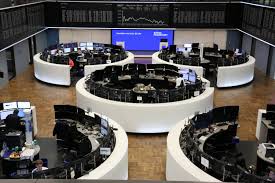European stock markets finished the day higher on Wednesday, after a short drop the day before that ended a long run of gains. Investors were paying close attention to what was going on with the U.S. Federal Reserve, which stayed in the spotlight because of rumors about future interest rate hikes. Positive performance across Europe gave people more faith in the market, even though mixed economic signs came from the UK, where net borrowing numbers were higher than expected.
The Stoxx 600 index for all of Europe went up 0.4%, and most groups were also up. Most of the rise in the index came from gains in technology and banking stocks, which have been doing well because people think the Fed might be less likely to raise interest rates in the future. As the world economy shows signs of slowing down, European investors are paying close attention to what the Fed does because they are worried about how higher borrowing costs might affect growth.
At the same time, the UK’s FTSE 100 index finished up by 0.3%. Even though it was reported that the UK borrowed more money than planned in July (£4.3 billion), this gain still happened. This amount was much higher than the £3.5 billion that experts had predicted. It was also a big jump from the £1.9 billion that was made in the same month last year. Concerns have been made about the long-term health of the UK’s public finances because of the higher levels of borrowing. This is especially true since the government is under more pressure to support the economy as inflation rises and wage growth stays flat.

European markets bounce back as investors keep a close eye on the Fed, while UK borrowing hits an unexpected high.DAX in Germany and CAC 40 in France both went up by 0.5% and 0.6%, respectively. Strong earnings reports from companies in Germany, especially those in the auto industry, made investors feel better. The French market was helped by a rise in stocks of luxury goods, which have been strong even though there are worries that global demand is slowing down. The gains in these important European markets show that investors are cautiously optimistic as they weigh the risks of higher interest rates against the chance that the economy will continue to grow.
In a wider sense, European markets have been dealing with two problems: rising prices and slower economic growth. Several times already this year, the European Central Bank (ECB) has raised interest rates. There is rising talk that it may soon take a break to see how these increases have affected the economy. The acts of the ECB and the Fed’s policy stance will have a big impact on how the market feels in the coming months. Investors are most worried about the chance of a recession that could happen if central banks tighten monetary policy too much.
A lot of attention was on the Federal Reserve because some important officials said that more rate hikes might be needed if inflation doesn’t go down. But some Fed members have also said that the rate of tightening might slow down if data from the economy supports a more cautious approach. This lack of clarity has made the market unstable, with European stocks going up and down as buyers try to guess what the Fed will do next.
Analysts are still not sure what the future holds for European markets, even though the market closed on a good note. The fact that the UK borrowed more than predicted and that inflationary pressures are still high shows that the economy still has a lot of problems. But the fact that key industries, like technology and finance, are still doing well shows that there are still chances for growth.
Finally, European markets ended the day higher on Wednesday. This was due to positive expectations about the Federal Reserve’s possible policy choices and the strength of certain industries. But the fact that the UK’s net borrowing was higher than expected shows that the economy still has problems. As central banks continue to try to find the right mix between keeping inflation low and boosting growth, investors will continue to pay close attention to economic data and policy announcements that could have an impact on the direction of the market in the coming weeks.